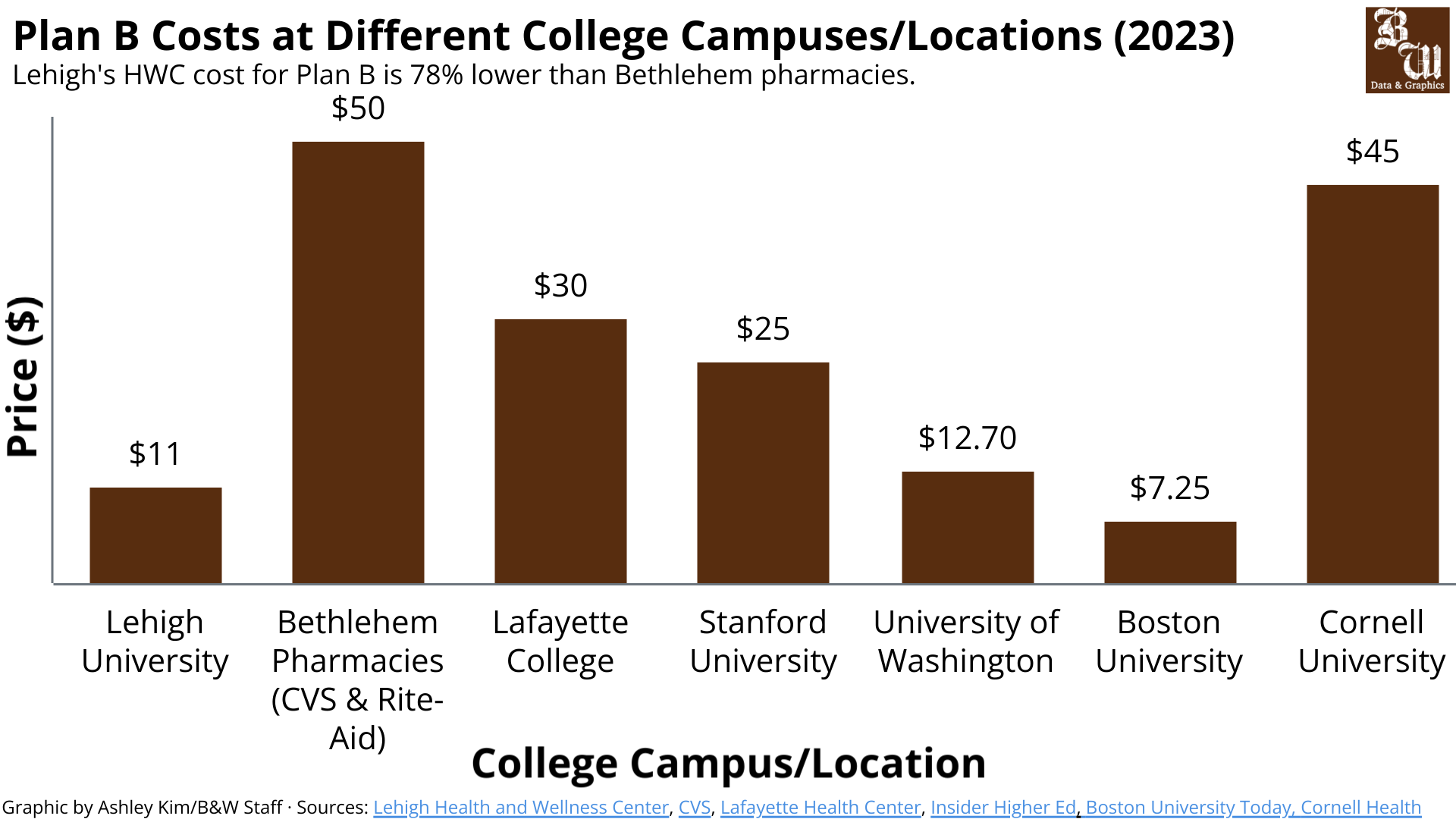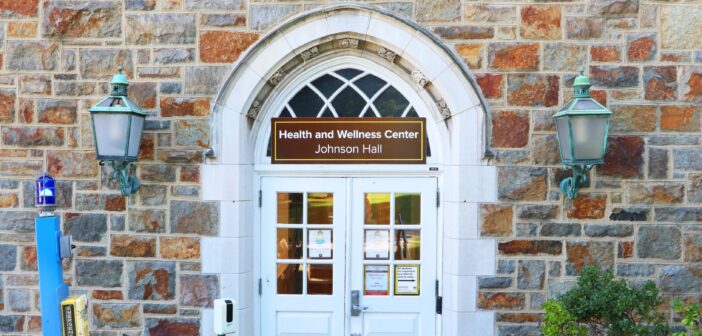As students witness the nationwide debate over contraception and differing birth control methods, concerns arise about resources on campus and within the community.
Margaret Renneisen, a physician at Lehigh’s Health and Wellness Center, said it’s important for students to be aware of the contraception options available to them.
“I can prescribe any birth control pill on the market,” Renneisen said. “I usually discuss options with each person individually.”
These options include condoms, diaphragms, both hormonal and non-hormonal intrauterine devices (commonly known as IUDs), birth control pills and spermicides.
According to Planned Parenthood, a diaphragm is a shallow, bendable cup that works as a barrier to stop sperm from joining an egg, and it’s 83% effective. IUDs are devices placed inside the uterus to prevent pregnancy and are 99% effective. Birth control pills are hormonal pills taken every day to prevent pregnancy with a 93% rate of efficacy.
These three options require prescriptions, but there are also over-the-counter birth control options including condoms and spermicides. According to Planned Parenthood, though these methods are less effective, they still work to prevent pregnancy, while condoms additionally guard against sexually transmitted diseases and infections.
Apart from condoms, Renneisen said there are no other forms of male birth control offered at the Health and Wellness Center.
This could be because men currently have only two options for birth control on the market: either using a condom or undergoing a permanent sterilization procedure such as a vasectomy, according to the National Institute of Health.
Renneisen acknowledges that women are usually the partners bearing the responsibility of using birth control.
“I think the onus is primarily on the female partner, not only because of the available options but also because, without contraception, she is ultimately the one who will potentially bear the physical responsibility of pregnancy,” Renneisen said.
She said confidentiality plays a crucial role in ensuring patients feel safe coming to the Health and Wellness Center.
“We are never in touch with people’s parents unless they ask us to,” Renneisen said. “Before we speak with anyone we get the students’ permission, and if the student says ‘no’ then that is their decision.”
Renneisen said the Health and Wellness Center is working on “everything” they can do to help with students’ reproductive health in a way each person is interested in managing it.
She said education surrounding contraceptives is important for students.
“Particularly for people who are college age,” Renneisen said. “You have a lot on your plates.”
Amelia Swenson, ‘26, is a member of Lehigh’s Break the Silence, an organization that offers programs dedicated to education on healthy sexuality and gender and sexual violence.
She said fraternities, sororities and residence halls can apply through Break the Silence to buy condoms, lube and other items that facilitate safe sex at subsidized prices if they attend a safe sex presentation by the organization.
Renneisen said insurance covers every contraceptive and birth control method the Health and Wellness Center provides. The only contraceptives the center charges a fee for are intrauterine devices, which would cost $30.
Students have access to emergency contraceptives, such as Plan B, which can be bought from the Health and Wellness Center for $11, compared to purchasing at CVS or Rite Aid for $49.99.
However, Lehigh’s Health and Wellness Center is closed on the weekends, which leaves students without access to these resources on campus during those times.
Swenson thinks changing this lack of accessibility over the weekend is important.
“A lot of unprotected sex that might warrant using Plan B happens on the weekends when people are using substances and not thinking,” Swenson said.
She said Lehigh offering subsidized Plan B is a step in the right direction, but having access to something like a Plan B vending machine would not only mean its always available but also anonymize its purchase.

Emily Hamer, ‘26, a student at Boston University, said students at her university have access to a vending machine that sells Plan B for $7.25, which makes the emergency contraceptive easily accessible to students.
Though vending machines like this are not available on Lehigh’s campus, the university works to ensure the proper tools to engage in safe sex are obtainable.
“It makes it not a big deal, in a way,” Hamer said. “Especially coming from Texas, there’s a totally different ambiance surrounding the idea of contraception.”
According to PBS NewsHour, in recent years, a wave of anti-abortion laws has swept across the nation, driven by a range of differing factors including religious beliefs, moral convictions and political ideologies.
The contentious battle over abortion and contraceptive rights sparked attention again surrounding the Dobbs v. Jackson Women’s Health Organization case in 2022. According to the Center for Reproductive Rights, this case revolved around a Mississippi law that banned most abortions after 15 weeks of pregnancy, with limited exceptions.
Political science professor Heather Swadley said Dobbs v. Jackson Women’s Health Organization decided there is no constitutional right to abortion, and decisions regarding abortion are instead left up to the states.
Swadley said this has created a form of “abortion federalism,” where states are able to enact rules and regulations about abortion.
“For now, Pennsylvania’s governor has promised to veto any legislation banning abortion, meaning abortion is legal in Pennsylvania,” Swadley said. “However, this could change subject to a gubernatorial election.”
Swenson said students did not have to think about access to birth control as much when reaching college age, but this consideration has already changed.
“At this point in time, you have to think about what the state’s regulations are when making a decision,” Swenson said.
Samantha Haggert, ‘24, who is a student assistant for the Center for Gender Equity, stressed the importance of having more dialogues surrounding sexual wellness on Lehigh’s campus.
“Destigmatizing sexual health on campus in general would be really awesome,” Haggert said. “To see more class-based discussions about it that take place further than your (first) year orientation — it would be good to continue those conversations as you grow.”






Comment policy
Comments posted to The Brown and White website are reviewed by a moderator before being approved. Incendiary speech or harassing language, including comments targeted at individuals, may be deemed unacceptable and not published. Spam and other soliciting will also be declined.
The Brown and White also reserves the right to not publish entirely anonymous comments.
1 Comment
As a married (35 yrs) father f three children I am very familiar with the subject. I am also a practical Catholic and know Church theology on pre-marital sex and birth control. Options for chastity and NFP were not mentioned? Early in my marriage my wife and I taught Natural Family Planning. Is this intentional?